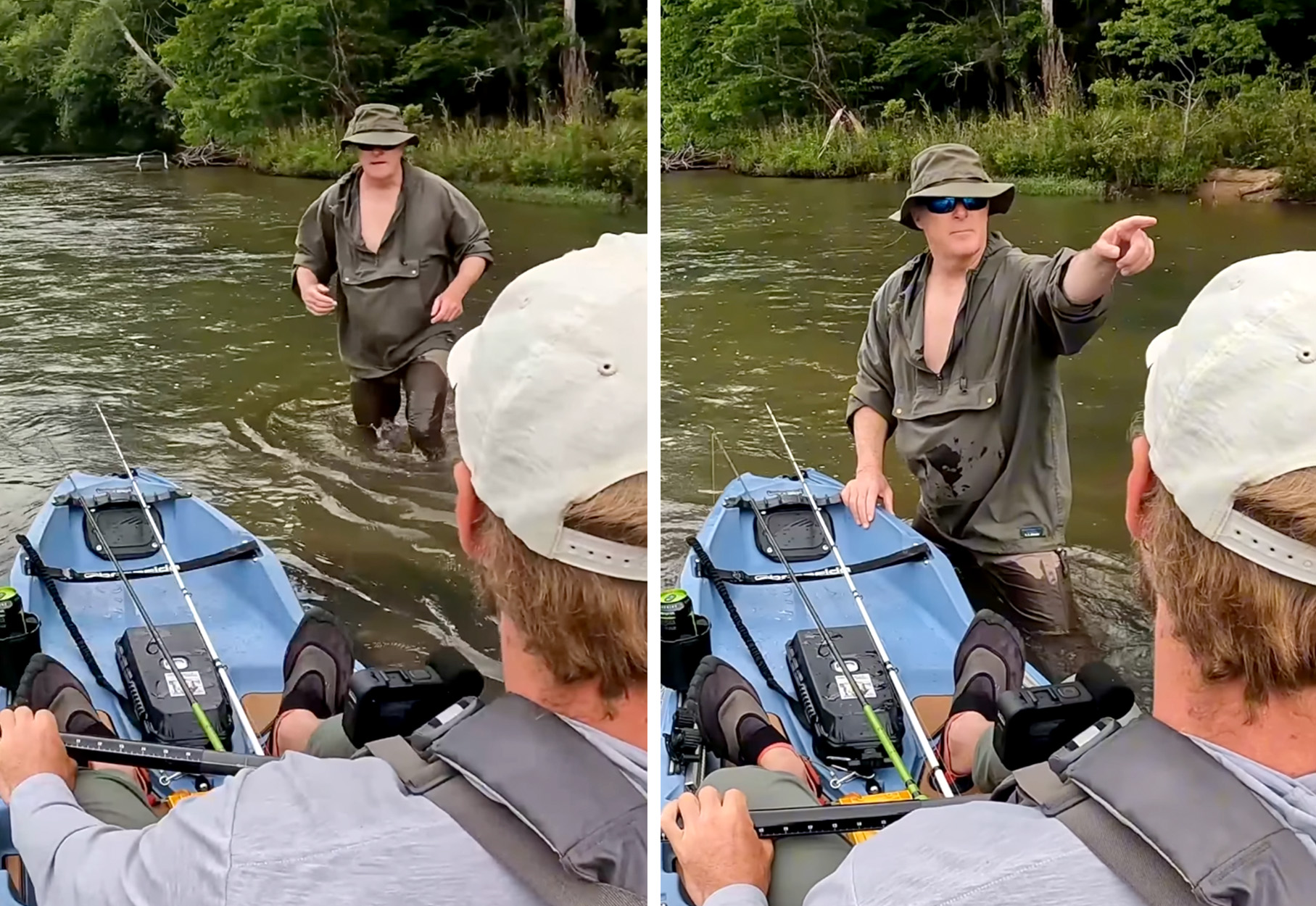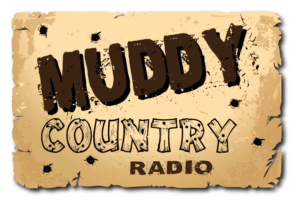
Watch: Landowner Tells Kayaker There’s No Fishing Allowed on ‘His’ Side of the River
June 26, 2024 - Blog
When Marshall Stamps paddled his kayak past multiple “No Fishing” signs on Georgia’s Flint River last month, he was surprised. The Flint is a public river, after all, and Stamps had put in at a well-marked public boat launch just a mile upstream. Stamps had floated and fished other rivers in Georgia, where the riverbeds of navigable waterways belong to the public, according to state law. So, he stayed in his boat and kept working his way down the posted bank, catching a few fish here and there.
Stamps was even more shocked minutes later, when a landowner waded out into the river to confront him. After introducing himself as Mike Smith, the landowner let Stamps know that he couldn’t fish there because that particular bank was privately owned and off-limits to public fishing. With a camera recording behind him, Stamps caught the interaction on video.
“From this riffle to the bottom of the mountain hole is private fishing,” Smith says in the video as he grabs ahold of the bow of Stamps’ kayak. “On the other [right] side of the river, over there, help yourself. But from that riffle [up there] to the mid-line of the river to all the way where it falls off to the mountain hole is private to fish.”
Not looking to argue, Stamps wishes Smith well and continued on downriver. He later went on Instagram to post the video of their interaction, thereby illuminating a long simmering debate over stream access laws in Georgia.
After his video amassed millions of views on social media, Stamps returned to the same stretch of the Flint with a local news crew. As they floated past the same “No Fishing” signs on the river’s left bank, they danced around an important question that’s now being considered by lawmakers in the state: Can you legally fish a public river in Georgia?
How (and Where) Things Got Complicated
For generations, Georgians have enjoyed the privilege of floating, hunting, and fishing along the state’s major rivers. (Smaller streams and creeks are a different story, and on many of these waterways, the streambeds are considered private property.) This has been a privilege ever since Georgia was granted statehood in 1788, when the state (and by extension the state’s residents) became the owner of all navigable streambeds. But the public’s ability to use and access these streambeds was thrown into question in the early 2000s, when some landowners on the Flint River began to challenge the longstanding notion of navigability.
Those landowners had properties along a well-known stretch of the upper Flint known as “Yellowjacket Shoals,” which offers some great fishing for shoal bass. It’s also the same area where Stamps was confronted by Smith in May.
A view of the upper Flint River from a private deck.
Photo by Laura Ballard / Adobe Stock
The private landowners on this stretch of the Flint contended that because their property deeds dated back to before 1863, when a written definition for “navigable streams” was added to the state constitution, the stretch of river in front of their properties was not considered navigable. They argued that this gave them ownership of the streambed from their bank to the river’s center line, which sparked a series of disputes with local outdoorsmen who’d been floating and fishing there for years.
In 2020, one of those landowners fired a gun at a family of paddlers, and he’s currently serving a 10-year prison sentence for that action. But his brother, Ben Brewton, sued the state and won a settlement in 2022, which declared that his pre-1863 deed gave him ownership over half of the streambed in the stretch of the Flint that runs adjacent to his property. It wasn’t long before more “No Fishing” signs started popping up along that stretch of the upper Flint.
This led to intense backlash from anglers and other public access advocates in Georgia. They saw this new exception on the Flint River as an assault on their rights to paddle, hunt, and fish the state’s major rivers. So, they flooded the inboxes of their representatives and the state’s Department of Natural Resources. Although the DNR had a legal obligation to enforce the court order, the agency sided with the public in July 2022 by announcing that it would not be citing anglers for fishing along the privately owned bank at Yellowjacket Shoals, according to the Georgia Recorder.
State legislators followed suit by hurriedly introducing a bill that re-emphasized and guaranteed Georgians their right to hunt, fish, and paddle in the state’s navigable rivers and streams. The fishing rights bill passed, and Gov. Brian Kemp signed it into law in May 2023.
But there was one glaring problem with the new legislation: It didn’t define “navigability” as it pertains to Georgia’s rivers. Which leaves Georgians’ newly re-established right to fish in public rivers up to interpretation.
The Navigability Issue
Laws pertaining to stream access and the ownership of streambeds vary by state. And Georgia isn’t alone in dealing with stream access controversies in recent years. The debate around who owns the riverbed has led to legal flare-ups in several Western states, including Utah, Colorado, and New Mexico — where the battle over stream access has grown particularly bitter since 2022, when the state legislature re-established the public’s constitutional right to wade and fish in rivers that flow over private property.
In many states, the crux of the issue boils down to one word: navigability. But its definition (which is severely outdated in many cases) has spawned so much conflict and confusion that some key decision makers, including the Colorado Supreme Court, have declined to weigh in on the matter. And since Georgia’s new law failed to provide an updated definition for the word, many have opined that the state’s stream access laws are murkier now than they were before the new law came about.
“It is much more unclear whether anglers, hunters, and paddlers can touch privately owned streambeds,” state senator Elena Parent told the Georgia Recorder in March. “And we should not set up a system where people can no longer use these navigable rivers that they have used for decades if an adjacent property owner all of a sudden decides the public can’t drop and anchor or use fishing lures on the bottom.”
State lawmakers have attempted to remedy this oversight by launching a committee that is tasked with deciding which rivers (and possibly which stretches of those rivers) should be deemed navigable. A bill introduced earlier this year names 64 different rivers and streams, including the Flint River, as potential candidates. The committee plans to study these waterways this summer and made recommendations to the House by Dec. 1, according to the Associated Press.
A kayaker paddles down the Chatahoochee River, which, along with the Flint, is being considered by lawmakers as one of 64 rivers and streams that can be deemed navigable.
Photo by Marcus Jones / Adobe Stock
Their task isn’t an easy one. They’ll have to consider the federal definition of navigability, which states that if the river was used by people for trade and commerce when Georgia became a state, it’s considered navigable today, according to a local NPR affiliate. This is slightly different than the state’s more specific interpretation of the word, which was established in 1863 and defines a navigable waterway as “a stream which is capable of transporting boats loaded with freight in the regular course of trade either for the whole or part of the year.”
It’s also possible that committee members will look at the concept of navigability on a segment-by-segment basis, instead of declaring entire streams navigable or not. This could lead to a whole new watershed map in Georgia, with certain stretches allowing public fishing and others allowing private landowners with deeds pre-dating 1863 to declare ownership of the streambed.
Read Next: Watch: Armed Alabama Man Charged After Cussing Out Bass Tournament Anglers
Until those decisions are made, Stamps says that he and other outdoorsmen are both confused and worried about the state of public fishing on Georgia rivers.
“The game wardens told me one thing. I’ve had legal representatives tell me another. So, myself and other anglers, we’re just really not sure of what the law actually is,” Stamps told reporters earlier this month. “It could be a stepping stone to more public areas and more things going private and not accessible to the public.”
The post Watch: Landowner Tells Kayaker There’s No Fishing Allowed on ‘His’ Side of the River appeared first on Outdoor Life.
Tune In: Randy Travis and Wife Mary Discuss Musician’s Rights and AI on GMA
Randy Travis and his wife Mary will be discussing musician’s rights around the American Music Fairness Act and industry-altering AI on Good Morning America tomorrow morning after testifying to Congress this afternoon. The hearing will begin at 2 P.M. EST today and can be livestreamed for those who want to watch [...]| Play | Cover | Release Label |
Track Title Track Authors |
|---|
